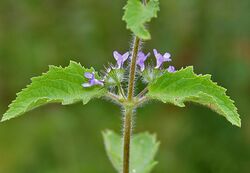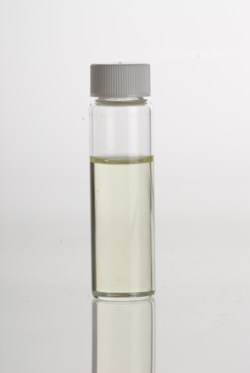Biology:Hyptis suaveolens
| Hyptis suaveolens | |
|---|---|

| |
| Hyptis suaveolens (Vilayti Tulsi) in Hyderabad | |
| Scientific classification | |
| Kingdom: | Plantae |
| Clade: | Tracheophytes |
| Clade: | Angiosperms |
| Clade: | Eudicots |
| Clade: | Asterids |
| Order: | Lamiales |
| Family: | Lamiaceae |
| Genus: | Hyptis |
| Species: | H. suaveolens
|
| Binomial name | |
| Hyptis suaveolens (L.) Poit. 1806
| |
Hyptis suaveolens,[1] pignut or chan, is a branching pseudocereal plant native to tropical regions of Mexico, Central, the West Indies, and South America, as well as being naturalized in tropical parts of Africa, Asia and Australia .[2] It is generally 1–1.5 m (3.3–4.9 ft) tall, occasionally up to 3 m (9.8 ft). Stems are hairy, and square in cross section. Leaves are oppositely arranged, 2–10 cm (0.79–3.94 in) long, with shallowly toothed margins, and emit a strong minty odor if crushed. Flowers are pink or purple, arranged in clusters of 1-5 in the upper leaf axils.[3]
Uses
Studies have found that H. suaveolens is effective as an insecticide.[4][5]
H. suaveolens can be made into a refreshing drink by soaking the seeds in water and refrigerating the mix. Some people add lemon or other citrus to improve the taste. In Colima, Mexico, people use the H. suaveolens seeds to prepare a traditional beverage called "Bate." The process consists in roasting and grinding the seeds and then mixing the resulting powder with water. H. suaveolens is also a traditional treatment for diarrhea.[citation needed]
See also
References
- ↑ Ann. Mus. Natl. Hist. Nat. vii. (1806) 472. t. 29. f. 2. (IK)
- ↑ Kew World Checklist of Selected Plant Families
- ↑ Weeds of Australia Factsheet — Hyptis suaveolens
- ↑ Cyrille Adda, Pierre Atachi, Kerstin Hell, and Manuele Tamò. Potential use of the Bushmint, Hyptis suaveolens, for the Control of Infestation by the Pink Stalk Borer, Sesamia calamistis, on Maize in Southern Benin, West Africa
- ↑ Conti et al. Hyptis suaveolens and Hyptis spicigera (Lamiaceae) essential oils:qualitative analysis, contact toxicity and repellent activity against Sitophilus granarius.
External links
- Making Chan drink (spanish)
- Using Chan as insecticide (spanish)
- Evaluation as Alternative Crop for Food and Drugs (spanish)
- Protein value of Chan (spanish)
- Chan used as diarrhea treatment (spanish)
Wikidata ☰ Q2235341 entry


